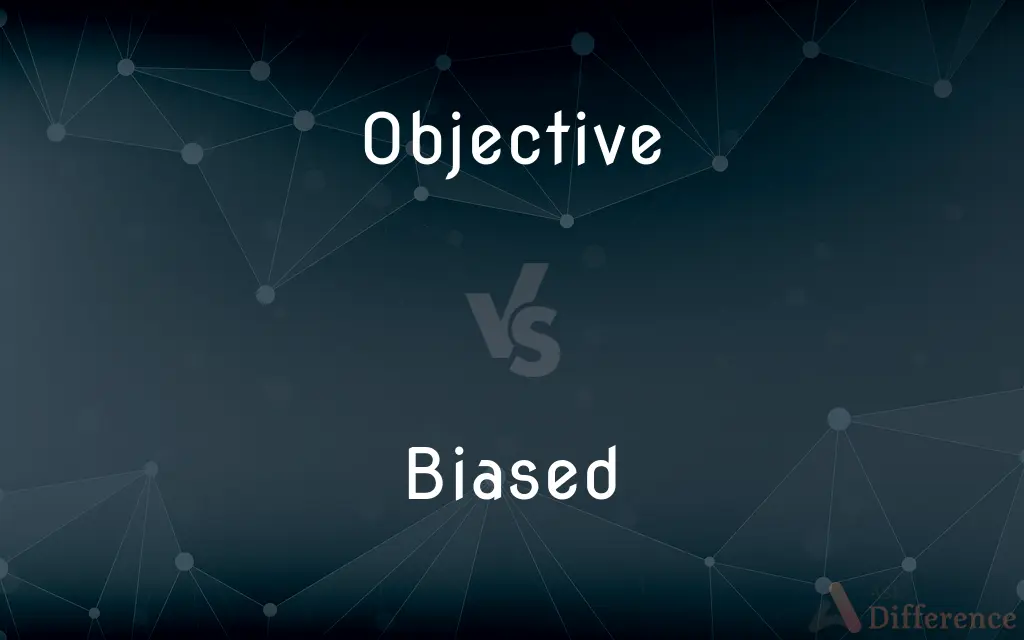Objective vs. Biased — What's the Difference?
By Tayyaba Rehman — Updated on November 4, 2023
"Objective" refers to being impartial and not affected by personal feelings, while "biased" indicates a prejudiced inclination towards or against a particular person or group.

Difference Between Objective and Biased
Table of Contents
ADVERTISEMENT
Key Differences
Objective analysis relies on facts without personal feelings affecting the outcome. In contrast, a biased perspective is infiltrated by personal judgment, which can color the interpretation of information. When someone is objective, they focus on the observable aspects without attaching personal belief systems, thereby maintaining neutrality. Biased thinking, however, is inherently subjective and is influenced by individual preferences, experiences, or cultural backgrounds.
The hallmark of an objective stance is its universality; it remains consistent regardless of who is observing or reporting. On the other hand, biased viewpoints are variable and often align with the specific inclinations or preconceived notions of an individual or group. Objectivity seeks to remove the individual's lens to achieve a more universally acceptable viewpoint, while bias accepts and often amplifies this lens.
In science and journalism, being objective is the ideal standard to ensure credibility and fairness. Bias in these fields undermines the trustworthiness and integrity of findings or reports. Objectivity is sought to represent issues and data as they truly are, free from personal interpretation, whereas bias distorts these representations according to personal or collective prejudices.
Objective methods are employed to achieve impartiality and accuracy, particularly important in decision-making processes. Biased methods or approaches, however, may lead to decisions that are not based on merit or fact, but rather on preconceived notions, potentially causing unjust or erroneous outcomes.
While objective information is essential for making informed and fair judgments, bias can sometimes be useful in understanding individual or cultural values. However, the impact of bias is often negative, leading to partiality and inequality, whereas objectivity aims to balance perspectives and promote equity.
ADVERTISEMENT
Comparison Chart
Influence of Emotions
Excludes personal feelings.
Includes personal feelings.
Basis of Information
Based on facts and evidence.
Based on personal beliefs or opinions.
Intention for Analysis
Seeks universal truth.
Seeks to confirm personal viewpoints.
Role in Decision Making
Aims for impartiality and fairness.
Can lead to partiality and unfairness.
Reliability
Considered more reliable and credible.
Considered less reliable due to prejudice.
Perception
Viewed as neutral and unbiased.
Viewed as skewed or prejudiced.
Cultural Influence
Minimized in objective analysis.
Often evident in biased perspectives.
Compare with Definitions
Objective
Unaffected by personal biases or emotions.
An objective review of the evidence led to her acquittal.
Biased
Lacking a neutral viewpoint.
Her biased opinion on the matter was due to her upbringing.
Objective
Aimed at achieving an impartial conclusion.
The jury is expected to remain objective throughout the trial.
Biased
Showing an inclination or prejudice for or against something.
The biased article portrayed only one side of the argument.
Objective
Uninfluenced by emotions or personal prejudices
An objective critic.
Biased
Distorting truth or information due to personal leanings.
The witness gave a biased testimony that favored his friend.
Objective
Representing facts without distortion.
His objective summary of the book was applauded for its fairness.
Biased
Having a tendency to have preconceived notions.
The teacher's biased grading system favored students from her alma mater.
Objective
Based on observable phenomena.
The scientist made an objective measurement of the temperature.
Biased
Exhibiting bias; prejudiced.
The newspaper gave a biased account of the incident.
Objective
Intended to be free of prejudice.
She offered an objective critique of all the candidates' policies.
Biased
Marked by or exhibiting bias; prejudiced
Gave a biased account of the trial.
Objective
Existing independent of or external to the mind; actual or real
Objective reality.
Biased
Angled at a slant.
The table had a biased edge.
Objective
Based on observable phenomena; empirical
Objective facts.
Biased
(electrical engineering) On which an electrical bias is applied.
Objective
A thing or group of things existing independent of the mind.
Biased
(statistics) Exhibiting a systematic distortion of results due to a factor not allowed for in its derivation; skewed.
Objective
The objective case.
Biased
Simple past tense and past participle of bias
She biased them against him for no apparent reason.
Objective
A noun or pronoun in the objective case.
Biased
Favoring one person or side over another;
A biased account of the trial
A decision that was partial to the defendant
Objective
The primary optical element, such as a lens or mirror, in a microscope, camera, telescope, or other optical instrument, that first receives light rays from the object and forms the image. Also called object glass, objective lens, object lens.
Biased
Excessively devoted to one faction
Objective
Of or relating to a material object, actual existence or reality.
Biased
Unfairly favoring one thing over another.
His biased decision was influenced by his personal connections.
Objective
Not influenced by the emotions or prejudices.
Objective
Based on observed facts; without subjective assessment.
Objective
(grammar) Of, or relating to a noun or pronoun used as the object of a verb.
Objective
Of, or relating to verbal conjugation that indicates the object (patient) of an action. In linguistic descriptions of Tundra Nenets, among others.
Objective
A material object that physically exists.
Objective
A goal that is striven for.
Objective
(grammar) The objective case.
Objective
(grammar) a noun or pronoun in the objective case.
Objective
The lens or lenses of a camera, microscope, or other optical device closest to the object being examined.
Objective
Of or pertaining to an object.
Objective
Of or pertaining to an object; contained in, or having the nature or position of, an object; outward; external; extrinsic; - an epithet applied to whatever is exterior to the mind, or which is simply an object of thought or feeling, as opposed to being related to thoughts of feelings, and opposed to subjective.
In the Middle Ages, subject meant substance, and has this sense in Descartes and Spinoza: sometimes, also, in Reid. Subjective is used by William of Occam to denote that which exists independent of mind; objective, what is formed by the mind. This shows what is meant by realitas objectiva in Descartes. Kant and Fichte have inverted the meanings. Subject, with them, is the mind which knows; object, that which is known; subjective, the varying conditions of the knowing mind; objective, that which is in the constant nature of the thing known.
Objective has come to mean that which has independent existence or authority, apart from our experience or thought. Thus, moral law is said to have objective authority, that is, authority belonging to itself, and not drawn from anything in our nature.
Objective
Unbiased; unprejudiced; fair; uninfluenced by personal feelings or personal interests; considering only the facts of a situation unrelated to the observer; - of judgments, opinions, evaluations, conclusions, reasoning processes.
Objective means that which belongs to, or proceeds from, the object known, and not from the subject knowing, and thus denotes what is real, in opposition to that which is ideal - what exists in nature, in contrast to what exists merely in the thought of the individual.
Objective
The objective case.
Objective
The goal intended to be attained (and which is believed to be attainable);
The sole object of her trip was to see her children
Objective
The lens or system of lenses nearest the object being viewed
Objective
Undistorted by emotion or personal bias; based on observable phenomena;
An objective appraisal
Objective evidence
Objective
Serving as or indicating the object of a verb or of certain prepositions and used for certain other purposes;
Objective case
Accusative endings
Objective
Emphasizing or expressing things as perceived without distortion of personal feelings or interpretation;
Objective art
Objective
Belonging to immediate experience of actual things or events;
Concrete benefits
A concrete example
There is no objective evidence of anything of the kind
Common Curiosities
Can a person ever be truly objective?
Complete objectivity is challenging but one can strive to minimize personal biases in judgment and analysis.
Why is being objective important?
Objectivity is important to ensure fairness, accuracy, and credibility in decision-making and reporting.
What does it mean to be objective?
Being objective means remaining neutral and uninfluenced by personal feelings when assessing something.
How can one maintain objectivity?
One can maintain objectivity by relying on evidence, recognizing personal biases, and focusing on factual information.
Can being biased be beneficial?
Being biased can sometimes provide insight into personal values or cultural norms, but it's generally seen as detrimental to impartial analysis.
Is bias always negative?
Bias is often negative when it leads to injustice, but it can also reflect personal or cultural identity.
What is an example of being objective?
An example of being objective is a judge not allowing personal feelings to affect a legal decision.
What does "biased" mean?
Biased means having a prejudice for or against something, often in a way that's considered unfair.
How can one identify bias?
One can identify bias by looking for patterns of favoritism, one-sided narratives, or information that lacks a balanced perspective.
What are the consequences of bias in research?
Bias in research can lead to invalid results and a loss of trust in the scientific findings.
What is an example of a biased statement?
"He's the best musician of all time" is a biased statement because it's based on personal preference.
Can objective writing still be engaging?
Yes, objective writing can be engaging by presenting compelling facts in a clear and concise manner.
How does one's background affect objectivity or bias?
One's background can influence objectivity or bias through pre-existing beliefs, cultural norms, and personal experiences.
Why is bias common in media?
Bias is common in media due to personal or corporate viewpoints influencing how information is presented.
How does bias affect communication?
Bias affects communication by potentially distorting the message and influencing the audience in a one-sided manner.
Share Your Discovery

Previous Comparison
Mobile vs. Motile
Next Comparison
Warranty vs. WarranteeAuthor Spotlight
Written by
Tayyaba RehmanTayyaba Rehman is a distinguished writer, currently serving as a primary contributor to askdifference.com. As a researcher in semantics and etymology, Tayyaba's passion for the complexity of languages and their distinctions has found a perfect home on the platform. Tayyaba delves into the intricacies of language, distinguishing between commonly confused words and phrases, thereby providing clarity for readers worldwide.















































